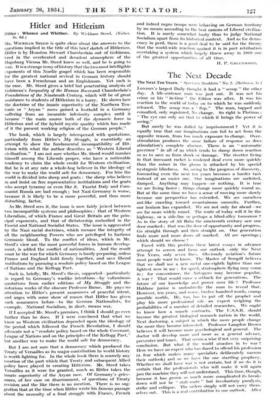Hitler and Hitlerism
Hitler : Whence and Whither. By Wickham Steed. (Nisbet. 3s. 6d.)
.Ma. Wiciattm STEED is quite clear about the answers to the questions implied in the title of this brief sketch of Hitlerisnr. Hitler is by Houston Stewart Chamberlain out of Gobineau, bred in the overheated and decadent atmosphere of the Hapsburg Vienna Mr. Steed knew so well, and he is going to war. It is a strange irony of history that the two most intelligible exponents of this Nordic gospel which has been responsible for the greatest national revival in German history, should have been a Frenchman and an Englishman.. Yet such is the case. Mr. Steed gives a brief but penetrating analysis of Gobineau's Inequality of the Human Races and Chamberlain's Foundations of the Nineteenth Century, which will be of great assistance to students of Hitlerism in a hurry. He shows how the doctrine of the innate superiority of the. Northern Teu- tonic or " Aryan " races gained a foothold in a Germany 'suffering from an incurable inferiority complex until it became " the main source both of the . dynamic force in Hitlerism and of the hybrid mystic quality which has made of it the present working religion of the German people."
The book, which is largely interspersed with quotations, particularly from Hitler's My Struggle, is essentially an attempt to show the fundamental incompatibility of Hit- lerism with what the author describes as " Western Liberal civilization." I am not sure whether Mr. Steed would number himself among the Liberals proper, who have a noticeable tendency to claim the whole credit for Western civilization. But he is at any rate a whole-hog believer in the ideology of the war to make the world safe for democracy. For him the world is divided into sheep and goats : the sheep who believe in and insist on free representative institutions and the goats who accept tyranny or even like it. Fascist Italy and Com- munist Russia are bad enough ; but Nazi. Germany is worse, because it is likely to be a more powerful, and thus more disturbing, factor.
As Mr. Steed sees it, the issue is now fairly joined between two incompatible systems and philosophies : that of Western Liberalism, of which France and Great Britain are the prin- cipal exponents, and that of dictatorship embodied in the Fascist and National Socialist States. The issue is aggravated by the Nazi racial doctrines, which menace the integrity of all the neighbouring Powers who are privileged to harbour Germanic blood. To the conflict of ideas, which in Mr. Steed's view are the most powerful forces in human develop- ment, is added the conflict of nationalities. And the result must be the war for which Germany is busily preparing, unless France and England hold firmly together, and save liberal institutions by pursuing a resolute policy based on the League of Nations and the Kellogg Pact.
Such is, briefly; Mr. Steed's thesis, supported—particularly in regard to Germany's warlike intentions—by voluminous quotations from earlier editions of My Struggle and the notorious works of the obscure Professor Banse. He pays no attention to Hitler's present assurances of peaceful intent, and urges with some show of reason that Hitler has given such assurances before—to the German Nationalists, for example. National Socialism, in short, means war.
If I accepted Mr. Steed's premises, I think I should go even further than he doeS. If I were convinced that what we knoif as Western civilization depended upon the ideology of the period which followed the French Revolution, I should advocate not a“ resolute policy based on the whole Covenant, League of Nations and on the principles of the Kellogg Pact,” but another war to make the world safe for democracy. _ .
But I am not sure that a democracy which produced the Treaty of Versailles as its major contribution to world history is worth fighting for. In the whole book there is scarcely_ any mention of the_part which that Treaty and subsequent Allied policy have played in creating Hitlerism. Mr. Steed takes Versailles as it were for granted, much as Hitler takes the innate superiority of the Aryan. race. Of Germany's griev- ances,. of her case on disarmament, of questions of Treaty revision. and the like there is no mention. There is.aa sag, gestion that at the time when Hitler wrote his famous passage about the necessity of a final struggle with France, French and indeed negro troops were behaving on German territory by..nci means aceording to the best canons of Liberal civiliza- tion. It is surely somewhat hasty thus to judge National Socialism apart from its historical context. And as for demo- cracy in peril, there is a good deal to be said for the theory that the world-wide reaction against it is in part retribution overtaking a system which largely threw away in 1919 one of the greatest opportunities of alt time.
H. P. GREENWOOD.










































 Previous page
Previous page